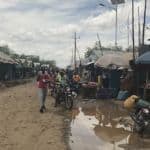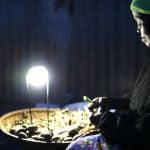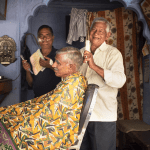An Overlooked Engine of Economic Growth: Delivering Products – and Enabling Livelihoods – in Refugee Communities
The Kakuma refugee camp in northwestern Kenya, and its nearby sibling Kalobeyei settlement, are home to nearly 200,000 people from 22 countries, mainly those displaced by war and political instability in South Sudan and Somalia.
Contrary to the image of a “typical” refugee camp or settlement, these are thriving communities, with markets and commerce that produce upwards of $56 million in economic activity per year. Together, Kakuma and Kalobeyei have approximately 2,500 street shops, salons, cafes and other businesses – and even their own soccer teams that play in Kenya’s national league.
Kakuma is one of the oldest camps in the world, and the scale of entrepreneurship there is even more impressive when you consider that its residents must spend much of their income on energy. Like many communities of forcibly displaced people, Kakuma doesn’t have grid electricity. This means residents must buy batteries for power, and need to burn wood and other fuels for heat and cooking. Only one in 20 Kakuma households has access to reliable electricity, which stifles economic growth.
Kakuma and Kalobeyei aren’t anomalies. Around the world, communities of refugees have the potential to be major economic engines for their host countries. Yet, for a variety of reasons, they’re not treated as markets for growth – either in terms of consumers or potential employees. As such, their competencies and skills often go to waste. Companies that may have a desire to distribute products in the camps lack the data insights to make a case that there is a demand, and this holds them back from building commercial relationships with this new consumer base.
Delivering Essential Services to Refugee Communities
The Smart Communities Coalition (SCC), a public-private partnership co-chaired by Mastercard and the United States Agency for International Development (USAID), works to improve the delivery of essential services to forcibly displaced individuals and their host communities. The SCC’s efforts focus on three foundational pillars — energy, connectivity and digital tools. Digital Agents for Energy+ is a new SCC program to train refugees and native-born Kenyans living near these communities as sales agents for solar energy products. Our goal is threefold: to spur entrepreneurship, deliver cheaper and more reliable energy to Kakuma and Kalobeyei, and develop new distribution models for the last-mile delivery of products and services to hard-to-reach places like refugee camps and settlements.
To that end, Mastercard – working alongside our SCC partners the Norwegian Refugee Council, the International Trade Centre and TOTAL – has built a digital platform to connect energy suppliers with local wholesalers who, in turn, onboard the digital agents to sell solar solutions (like solar home systems or solar lanterns), provided by TOTAL, in the community. Think of it as gig work for motivated individuals seeking meaningful employment in places where opportunities can be limited.
In building this platform, we explored all aspects of starting a new venture – from developing unique selling points for the products, to assessing environmental factors and addressing supply and demand challenges. Transparency and reliability became two important goals for the use of the digital platform, as we needed to establish trust with the sales agents who would utilize it. To that end, we made sure that agents were able to receive notifications of any actions taken – as well as actions needed: for example, verifying that a transaction took place, turning over cash from a sale, confirming that commissions were received from wholesalers, etc. In the lead-up to the launch of product sales, we deepened our engagement with our wholesalers and digital agents, delivering more remote training sessions to ensure that they felt prepared and equipped to sell in the community. In turn, they provided us with valuable feedback to help us fine-tune the digital platform: For instance, they requested that we create hyper-localized tags for Kakuma’s four districts and the town that surrounds it, enabling them to more accurately track their customer sales and monitor demand in the different areas of the settlement. This helps suppliers to be more proactive in restocking those wholesalers that have sold out of products.
The Norwegian Refugee Council and International Trade Centre serve as mentors and guides for our agents and wholesalers on the ground. With access to business and entrepreneurship training, many participants have remarked that the skills they’ve learned can be applied well beyond the program.
Adapting the Program to the Challenges of COVID-19
Though these results are encouraging, COVID-19 has upended many of our best-laid plans, and our program has gone through its share of implementation challenges, such as drops in disposable income from reduced aid. And of course, since travel is currently out of the question, we shifted from in-person training to remote training. Through Zoom, via my couch in Paris, I taught our agents and wholesalers in Kakuma and Kalobeyei how to use the Digital Agents applications. These apps run on cloud technology to deliver secure storage and data processing capabilities, helping to simplify the onboarding and management of our wholesalers and agents.
Sales have started off small in Kalobeyei, as we opted for a phased approach to allow everyone to get their bearings and foster effective wholesaler-agent relationships. The program has since expanded to all the districts of Kakuma, as well as Kakuma Town. In a matter of weeks, the agents have sold dozens of products and are gaining momentum and confidence. As with any new business, awareness is critical – so partners on the ground have been equipped with marketing materials to drive further interest.
Despite the uncertainty and turmoil faced by many around the world today, we must hold fast to the notion that when we come together to apply our knowledge, resources and technology to critical challenges, we can create a more inclusive economy for everyone. Local entrepreneurship and local development are key to driving growth and resilience, no matter where you are in the world. Digital Agents for Energy+ is one stepping stone to a sustainable model that can scale beyond solar energy – and beyond Kakuma and Kalobeyei. By providing service providers with the means to reach those who have been left behind, we shine a light on not just the needs but the potential of underserved communities.
Sasha Kapadia is the Director, Humanitarian & Development at Mastercard.
Photo caption: An entrepreneur in the Kakuma camp. Photo courtesy of EU Civil Protection and Humanitarian Aid.
- Categories
- Energy



